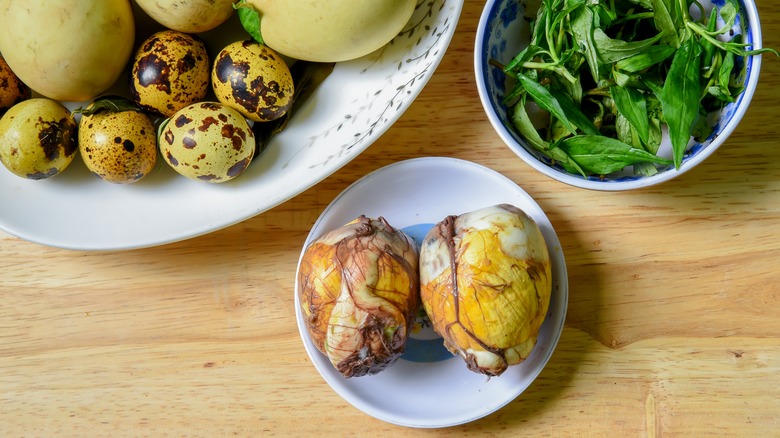When It Comes To Seasoning Balut Eggs, Less Is More
Balut, the hardboiled, fertilized, and incubated duck eggs popular in Filipino street food, are not for the faint-hearted. However, some culinary enthusiasts are steeling themselves to the bare reality of balut and wondering how best to enjoy this delicacy.
We may assume that, as with other eggs, they would be at their best with a generous amount of seasoning, but that is incorrect. The presence and development of the embryo, and the way it influences the fluid inside the egg, means that the best way to enjoy a balut egg may be just as it comes, with very minimal extras.
In the Philippines, balut eggs are traditionally eaten straight from the shell, sometimes with a pinch of salt and pepper, while Cambodians add a splash of lime juice to their version called phog tea khon. In Vietnam, folks may add ginger and laksa leaf to their hot vit lon.
Balut eggs season themselves
Why should balut eggs be minimally seasoned? The answer is in their chemistry. By allowing the egg to be fertilized and begin developing, the liquid inside the shell is influenced by the presence of the embryo. This process, known as sol dispersion, occurs when several large molecules (in this case, the embryo) are suspended in a liquid (the membrane protecting the embryo).
When the egg is boiled, the membrane (thanks to the dispersion process) becomes a kind of broth that is typically sipped during the consumption of the balut egg. This results in a naturally meaty taste that's unique to balut eggs because of the very specific way they are prepared.
To best enjoy balut, foodies are better off relying on the natural flavor of the eggs rather than covering it in spices and sauces. A pinch of salt and pepper may be all you need.

